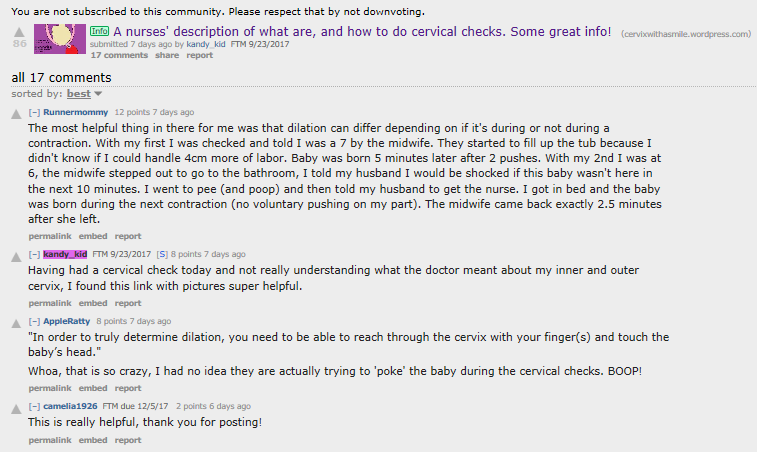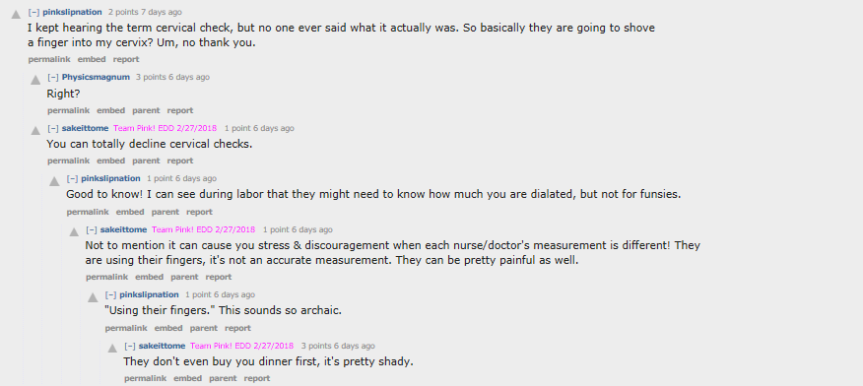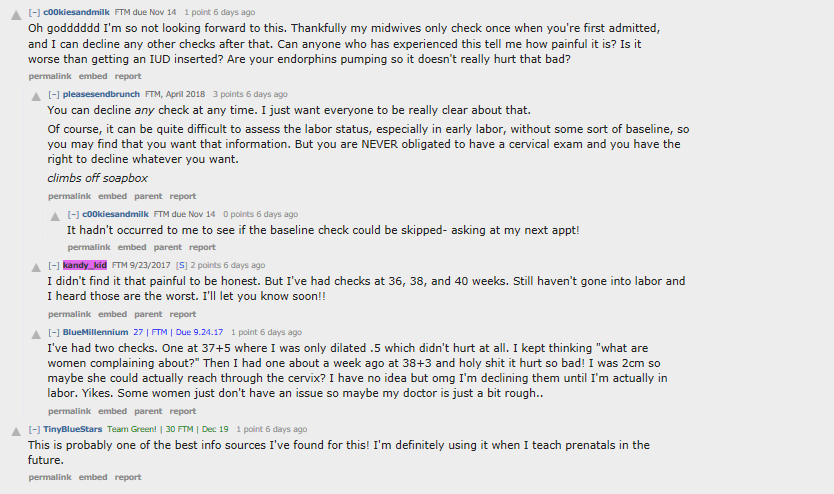Sometimes when your normally low readership stats spike, you have to go find the source of the commotion. Lo and behold, someone linked my post, The Mystery That Is The Cervix, on Reddit. There are currently 17 replies on the link, and because I’m just that tickled at some of the responses, I decided to post a follow-up that both replies to the comments, expounds a bit on my original post, and gives a bit more info on related topics. Let’s get going.

Runnermommy (Comment 1):
You’re not the only one who’s expressed surprise that dilation can differ during a contraction. If you think about it, though, it makes sense. The increase in pressure during a contraction puts pressure on the baby and the amniotic fluid (if present), which is going to push the baby’s head down toward the cervix, which is designed to stretch and dilate. More pressure means more dilation/stretching, so it isn’t uncommon for cervical dilation to increase during contractions, then return to what it was (or at least close to it) afterward. Sounds like you’ve had enviable labors, though if you were dilated to 7cm on your first check, you only had 3cm left to go, not 4. 😉 Either way, that’s impressive, especially for your first baby!
Fun fact: I have read that somewhere around 80% of the power that deliver your baby is what’s referred to as the “primary powers” of labor–those raw, involuntary uterine contractions. The “secondary powers”–you actually voluntarily pushing–only comprise 20% of the force behind pushing. That’s why your providers will tell you to only push during contractions–you maximize your efforts when you cooperate with those powerful contractions. This is also why it is very possible to deliver a baby without voluntarily pushing at all, as you described–your body is doing the lion’s share of the work for you, completely involuntarily! Keep in mind, however, that this is most often seen only in patients with epidurals because unmedicated women–and even some women with epidurals–will reach a point in labor when pushing with contractions stops being a voluntary action and she finds she can’t help but push!
(*source citation pending…working on finding that article!)
Kandy_Kid (Comment 2):
Glad this helped you! I understand it can be intimidating, but don’t hesitate to ask your provider to expound on what they’re saying if you don’t fully understand it. Sometimes, we as providers forget that not everyone knows what we know, especially when we are using technical terminology with other healthcare professionals all day. It is actually a welcome stop when patients politely ask me to further explain concepts because it tells me they’re 1) interested and 2) listening!
Appleratty (Comment 3):
Boop, indeed! Kinda helps to explain why it feels like such a reach, doesn’t it?

pinkslipnation Thread (Comments 5, 6, 7, 8, 9, 10, 11):
Trust me, checking cervixes isn’t something any of us L&D nurses do for “funsies”, nor would I suggest it to patients as a form of sport! In fact, I’d argue that we want to check cervixes about as much as you want a stranger’s fingers in your vagina!
sakeittome is correct. You can decline cervical checks, but at the same time, you also limit what we can do for you–either to relieve your pain, assess your labor and/or to advance your labor toward delivery–when you decline cervical checks. Like I said, cervical exams aren’t performed for fun. Cervical exams often help to determine if/when you will be admitted (for more on that, look here), if you can get IV pain meds, an epidural, and how to pharmacologically advance labor (ie, which drugs can be used if you need a little help!). Cervical exams can also tell us important information about labor itself, such as whether or not it is progressing at a relatively normal rate (which, for first-time moms, is an average of 1cm of dilation per hour), if it is dysfunctional (for instance, if you’re contracting like you’re in transition, but you’re only dilated to 2cm!), or, conversely, if something is off and you have a medical need for intervention.
One point I’ll correct is where sakeittome indicated that cervical exams aren’t accurate. What I believe you mean is that they aren’t exact. You can’t determine cervical dilation manually in a way that is objective–it’s not the same as taking someone’s temperature, for instance. Yes, it is possible to have an inaccurate interpretation of a cervical exam. An example would be when a patient is dilated about 1-2cm (a reasonable variation in cervical exam interpretation between providers), but the person checking says the patient is dilated to a 5. That is inaccurate. Thankfully, however, this is rare. However, that is part of the reason why it is best to avoid cervical exams during labor if possible–there is a psychological component to labor and if you keep hearing that you’re not changing or you feel you’re not changing enough hour after hour, that can be very discouraging and draining. However, as I noted above, there are still good reasons (especially if you’re being induced or you want interventions like pain relief) for more frequent cervical exams during labor. And you never know–you may be one of those gals who doesn’t think she’ll want to be checked during labor but find out that you really, really need to know if you’re making progress.
Once again, no argument–checking cervixes “using fingers” is archaic and it can be painful. Unfortunately, it’s the best we’ve got. If you can think up a cost-effective, objective, non-invasive method of measuring cervical dilation, by all means, let us know. L&D nurses everywhere will love you. We might even buy you dinner! 😉

c00kiesandmilk Thread (Comments 12, 13, 14, 15, 16):
Midwives are a good way to go if you want to have a reasonable shot at not being checked on a schedule while laboring. Many midwives are more naturally-minded (many, not all, so ask first!), so they will not be as insistent on checking you, especially if your labor isn’t fraught with intervention. For more on why midwives rock, check here!
While I’ve never had an IUD inserted, I’ve been told by several L&D coworkers that UID insertion invariably hurts like the dickens, but depending on the gentleness of the person checking you, cervical exams shouldn’t be anywhere near that painful. Keep in mind, if you want a break, say so! Do so as kindly as you can, but don’t be afraid to assert yourself. You’re the one laboring, not your providers!
Again, pleaseandbrunch is right. You can decline a cervical exam any time. Just keep in mind that there can be consequences and if you are going to decline, it’s a good idea to ask why you’re being checked, what risks there are in not checking you, and how your labor may be altered if you aren’t checked. The staff should be happy to explain this to you!
With regards to pain during cervical exams, it really depends on 3 things: where your cervix is, how you tolerate pain, and how gentle your checker is. If your cervix is high and hard to reach, you could have the sweetest nurse ever checking you and it may still hurt like crazy! However, even if you’re fully dilated (cervix is gone!) and your nurse doesn’t have to reach far to check you, if you have a nurse who is routinely a “rough checker” (slang term around my workplace), it may still hurt! If you’re nervous, ask your provider to be gentle and go slow. That can make all the difference in the world. My personal policy is to treat every vagina as if it were my own, but unfortunately, I can tell you firsthand that that isn’t universal policy in OB (though it really should be!).
TinyBlueStars (Comment 17):
Happy to hear my original post may help you. I also had difficulty fiding information laid out in a comprehensive, complete format when I was learning the art of the cervical exam. My goal with my original post was to make it easier for RNs learning this procedure to go in feeling more confident in what is invariably an incredibly awkward situation. Best of luck!
~~~~
Cheers, Reddit readers! Labor on!


One thought on “An RN’s Reddit Replies”